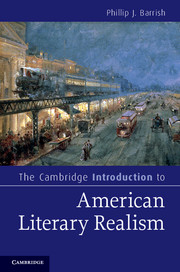Book contents
- Frontmatter
- Contents
- Illustrations
- Acknowledgments
- Introduction: American literary realism
- Chapter 1 Literary precursors, literary contexts
- Chapter 2 The “look of agony” and everyday middle-class life
- Chapter 3 Creating the “odour” of the real
- Chapter 4 Conflicting manners
- Chapter 5 “Democracy in literature”?
- Chapter 6 “The blab of the pave”
- Chapter 7 Crisis of agency
- Chapter 8 “Certain facts of life”
- Chapter 9 “The unjust spirit of caste”
- Chapter 10 New Americans write realism
- Conclusion: realisms after realism
- Notes
- Works cited
- Index
Chapter 8 - “Certain facts of life”
realism and feminism
Published online by Cambridge University Press: 05 June 2012
- Frontmatter
- Contents
- Illustrations
- Acknowledgments
- Introduction: American literary realism
- Chapter 1 Literary precursors, literary contexts
- Chapter 2 The “look of agony” and everyday middle-class life
- Chapter 3 Creating the “odour” of the real
- Chapter 4 Conflicting manners
- Chapter 5 “Democracy in literature”?
- Chapter 6 “The blab of the pave”
- Chapter 7 Crisis of agency
- Chapter 8 “Certain facts of life”
- Chapter 9 “The unjust spirit of caste”
- Chapter 10 New Americans write realism
- Conclusion: realisms after realism
- Notes
- Works cited
- Index
Summary
For much of the nineteenth century, a set of codes and conventions defining proper femininity, so-called “true womanhood,” was articulated and enforced by culturally authoritative sources such as ministers, politicians, and teachers, as well as by wide-circulation magazines such as Godey’s Lady’s Book and popular domestic fiction. Influential figures and texts defined “true womanhood” by the key values of female purity, submissiveness, piety, and domesticity (Welter, “Cult of True Womanhood”). Directed primarily at middle- and upper-class white “ladies,” but also affecting working-class women and women of color, true womanhood ideology held that the nation’s public arenas of business, professional life, politics, and governance were and should be reserved for men, who were by nature smarter, stronger, and more competitive than women. A woman’s realm was the home, where she was supposed to nurture her children and provide an attractive space of tranquility and spiritual refreshment for her husband when he returned from his difficult work in the outside world of men. True womanhood ideology assumed women’s spiritual and moral superiority over men, but at the same time its emphasis on purity, domesticity, and submissiveness was used to justify women’s exclusion from the full rights and responsibilities of American citizenship. Instead of participating in democratic debate (including voting) or trying to create private wealth, women should strive to embody the idealized figure that an immensely popular 1854 poem by Englishman Coventry Patmore dubbed “The Angel in the House.”
In 1848, the United States’ first organized Woman’s Rights Convention was held in Seneca Falls, NY. A total of sixty-eight women and thirty-two men signed the convention’s Declaration of Sentiments, which was written on the model of the US Declaration of Independence and called for equal rights for women. Such calls grew in number during the latter part of the nineteenth century, as a wide range of women writers and activists actively challenged aspects of true womanhood ideology. For instance, Victoria Woodhull declared herself a candidate for president in the 1872 election (the same presidential election in which both Sojourner Truth and Susan B. Anthony made unsuccessful attempts to vote) and wrote articles supporting “free love” in a newspaper she and her sister edited. Woodhull and other feminists argued that marriage was simply a form of legalized prostitution too hypocritical to recognize itself as such. They made the radical assertion that, in Woodhull’s words, “ownership and control of her sexual organs” should belong to a woman herself both before and after marriage, and never to a man, including even her husband (Woodhull, Reader 40).
- Type
- Chapter
- Information
- The Cambridge Introduction to American Literary Realism , pp. 134 - 153Publisher: Cambridge University PressPrint publication year: 2011



